BELONG IN THE MOMENT | PIP HARE
48°52.6′S 123°23.6′W—these are the coordinates of Point Nemo, named after Jules Verne's famous captain, located deep in the South Pacific Ocean and one of the most remote places in the world.
Point Nemo is an invisible spot in the vast Southern Ocean Point, furthest away from continental landmass in any direction. It is closer to the International Space Station than to the nearest land, 2,688 kilometres away. It is also where offshore sailor Pip Hare discovers that the rudder is broken on January 4th, 2021, during the infamous Vendée Globe – a solo non-stop round-the-world race.
The weather is furious, the waves are big, Pip and her 60 foot IMOCA Medallia have just come out of a gale, and she is expecting another one behind her. It is relentless out there. Squall after squall, multiple wind shifts, waves coming from every direction. The boat carries almost 600 square meters of sail and she is a 72-kilo woman alone in the Southern Ocean. It is impossible to stand or move around without holding onto something, and she has to crawl on her hands and knees. To replace the rudder, the boat needs to be flat, stable, and still. The only viable option is to head north to find a high-pressure weather window.
Single Image Text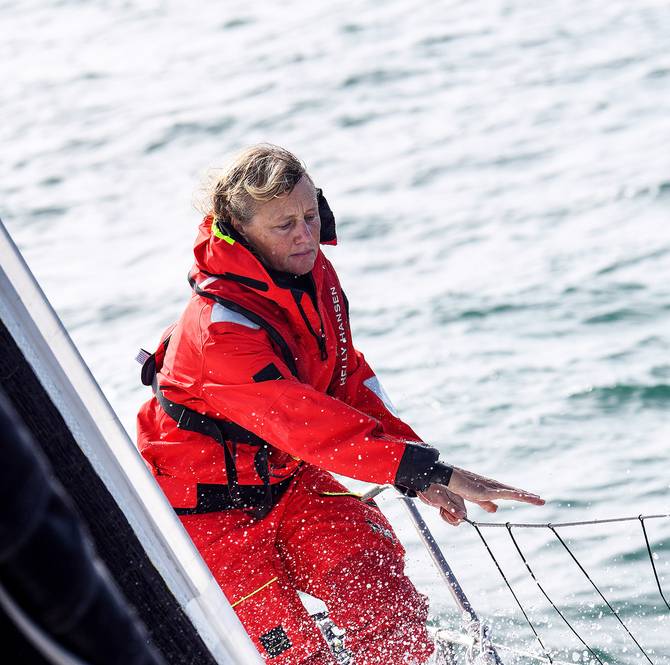
Once she commits, she must act fast, and it's no easy task. You could call it ridiculously difficult. Everything is effort, working your arms and legs constantly, dragging heavy loads, your back under pressure, the boat moving erratically, trying to find your balance, being thrown around, falling over, cutting your fingers, bashing your head, bruising your knees and legs, it's cold, every part of your body hurts, and then: YES!!! The new rudder is in, and Medallia is back in the game.
At Point Nemo, Pip Hare was ranked 15th in the race. After the rudder problem, she was 17th at Cape Horn, and in the South Atlantic, she had to slow to reseal the rudder tube, which was letting in significant amounts of water. Then, on February 12th, at 00:57:30 hrs, she crossed the finish line of the Vendée Globe in Les Sables d'Olonne on the west coast of France at a remarkable 19th place, fulfilling the dream she has held since she was a teenage sailor in East Anglia.
After 95 days, 11 hours, 37 mins and 30 seconds of racing, 47-year-old Pip Hare was the first British skipper to finish the 2020-21 race and only the eighth woman ever to finish the Vendée Globe in its history. More men have walked on the moon than women have completed the Vendée Globe.
"More men have walked on the moon than women have completed the Vendée Globe – the solo non-stop round-the-world race."
A DREAM IS BORN
Pip's performance on the 21-year-old IMOCA, one of the oldest boats in the fleet, drew admiration from all corners of the world, not just for her level of motivation, drive, and ability to push, but also for her intelligent and efficient navigation.
"I lived in a landlocked county, and sailing wasn't a natural part of my environment. I wasn't spending every weekend on the water, there weren't sailing clubs, there weren't people in my life that I could emulate. Then I started reading sailing magazines, finding out about these ocean races, particularly the Whitbread. And it was this incredible frontier of adventure and sports colliding," Pip says.
"One day, I picked up a magazine and started reading about the BOC Challenge, which was the forerunner to the Vendée Globe, and two things struck me about that. The first one was that the boats were the same size as some of the boats that were raced fully crewed in the Whitbread, yet they were being raced single-handed non-stop around the world. So that in itself was just massive—they've taken a race that was challenging already, and they've turbocharged it. And then suddenly, there's this woman, and she's competing in the race. Isabelle Autissier, a French woman, was competing in this hardcore race on equal terms with the men, and the way she was written about was the same way they were writing about the men. And I just thought that's for me, that's the race I'm going to do. And that led into the Vendée, and since the age of seventeen, I just had this ambition, this objective, this desire that I would compete in that race."
The late teens are a stage in life where you start to see what's possible and want to do things, you want to progress, but you're often restricted in what you are allowed to do. During these years, Pip discovered that sailing was empowering. It allowed her to make decisions, it allowed her to take risks, it allowed her to be free in a way that the rest of life didn't seem to. And it appealed to her—all of a sudden, the world seemed to open up to her.
But solo sailing isn't a discipline that's particularly well-known or well-supported in the UK. So unlike other sports and other forms of sailing, there wasn't a pathway that she could follow, and she had to make her own way.
"I just really wanted to challenge myself, and I wanted to take part in a sport where there were no barriers. I'm a person who doesn't like limits or barriers or rules or anything like that; I just want to be allowed to be me, which includes making mistakes and getting things right. But, still, more than anything, I need to be passionate, and sailing definitely was something I was passionate about when I was young."
Full Width Image Text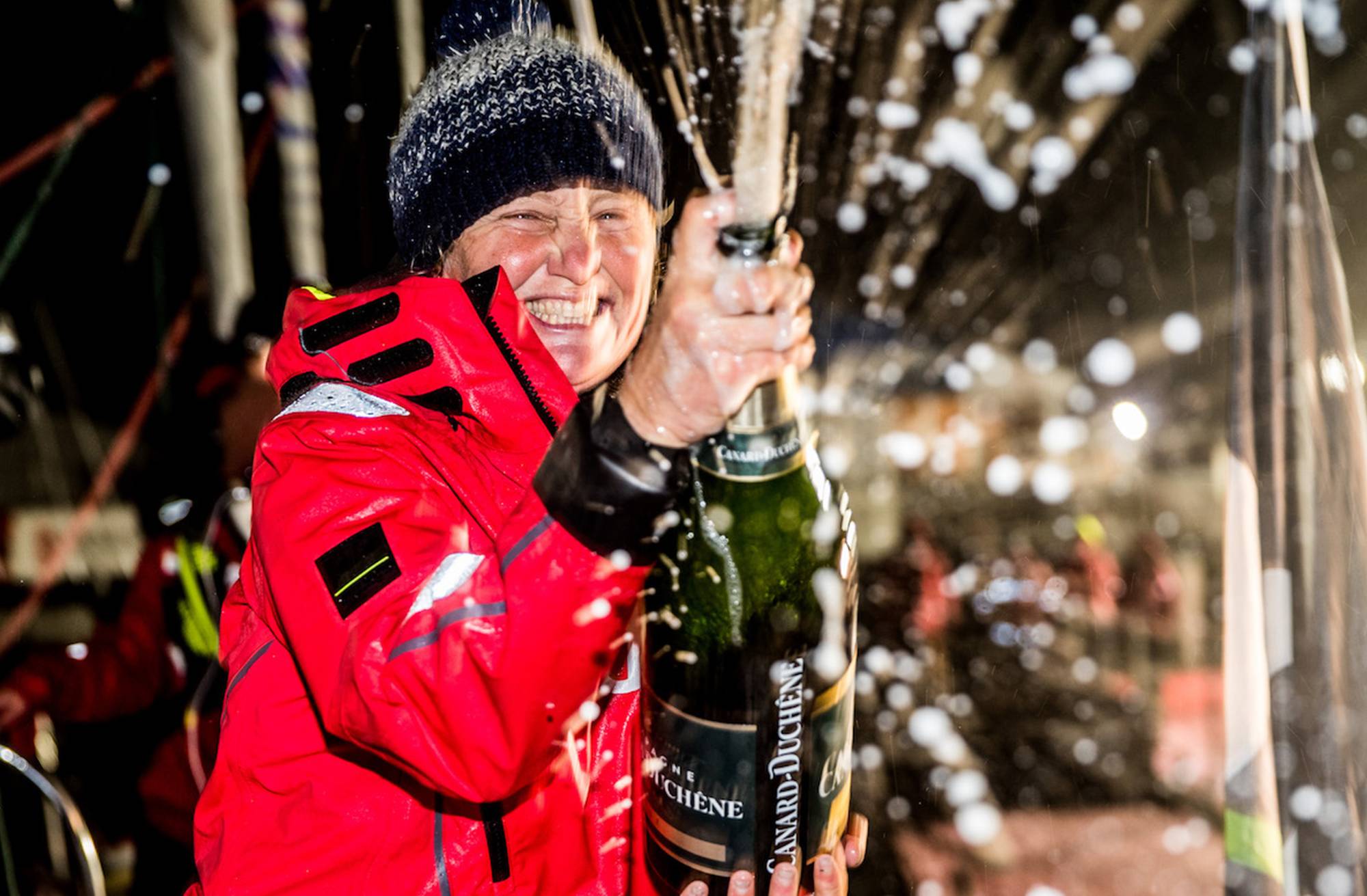
COMING OF AGE
Dreaming is easy—hanging on to the dream for years is the tricky part. For Pip, it was a matter of jumping into the thick of it at the first opportunity. She went straight from school into an apprenticeship with a sailing school and started sailing full-time across oceans as a profession when she was eighteen.
Every four years, she would see the Vendée go off, and it would reignite this feeling inside her of "I want to do that, I believe I can do that, I'm capable of doing that. But, still, there were times in my career when I did turn around and say, 'I'm never going to make this, I'm never going to make it happen. I don't know what to do next.' And I would take my foot off the gas and go in a different direction but never found satisfaction there and was always drawn back to this race."
In 2009, she sold her home (a boat she was living on at the time) and took her first steps into the world of solo sailing while living in a van. Since then, she has pushed herself through every level, always trying to find the next step, trying to perform at the next level, constantly bumping into new barriers along the way.
"There is no public funding available for this sport. You have to raise all of your funding and map out your training and competition, and I decided that if I was going to do this, then my skin very much had to be in the game, and I would give it everything that I had. Twice in my life, I've hit complete rock bottom, not knowing how I would find the money to buy food for the next week. I lived in a van for a while, I sold everything I had to get my boat, but there's a level of perceived hardship in that—it's not real hardship because I chose to do all of those things."
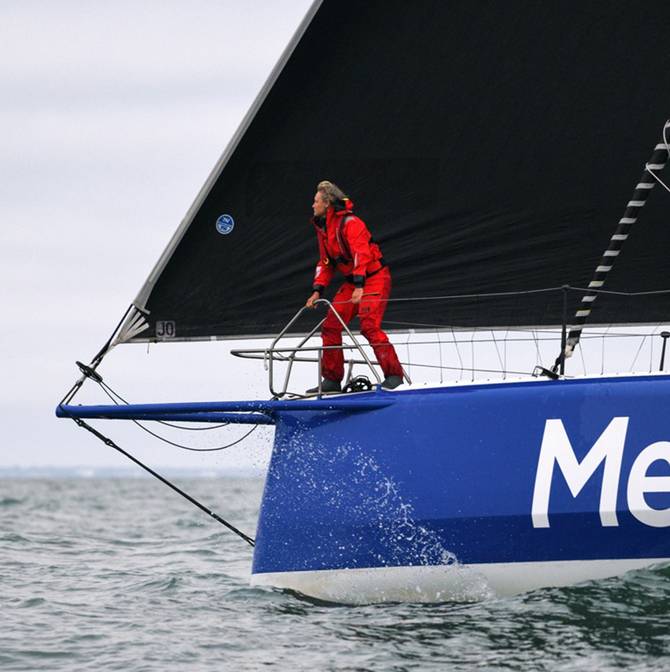
Two Column Image Text Left
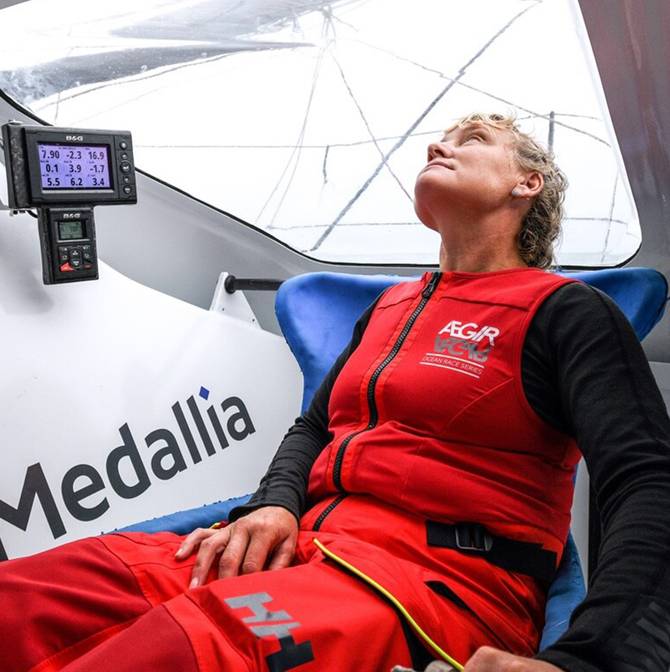
Two Column Image Text Right
THE EVEREST OF THE SEA
The Vendée Globe is three months alone at sea, thousands of miles away from help, and it’s one of the toughest things Pip has done in her life. "There are so many things that are hard about this race. I think just being on the ball, staying competitive, forcing yourself to care, and putting in that extra effort for ninety-five days in a row, is a hard thing to do. You know the hard skills that you need, the technical ability to fix things on the go when it's cold and wet and dark. I was dealing with some level of anxiety because you are thousands of miles from any help, and I was walking this knife-edge all the time. At one stage, I ranked 15th, and I had six boats behind me. I was pushing the boat so hard because it was exciting, it was incredible, it was my opportunity to show what I could do. I knew I had the second oldest boat in the fleet and was competing with boats that I shouldn't have been anywhere near, and all the time I'm also wondering how hard I can push it," she explains.
The balance of finishing a race where you have sailed your socks off, or doing something really stupid, pushing outside the boundaries of what is sensible and losing it all because you dismast or something else, is a delicate balance indeed. The harder you drive, the more incredible performance comes out, and that's the best feeling in the world. But, at the same time, as Pip says, "it’s the cold hours, it’s nighttime, it’s the hard stuff, and there’s no-one there, except you."
More than anything, the Vendée is about trust in yourself and your knowledge. "The interesting thing about solo sailing is there is no one there; no one knows how hard you worked, no one knows if you could have made a sail change and you didn't because you didn't want to or you were too tired, or you couldn't be bothered, no one knows. And sometimes you are just so exhausted emotionally, mentally, physically, and something needs to be done, and that's when you need to dig deep and understand why you are doing this. For example, at the end of 24 hours where I've hardly had any sleep, it's freezing, and I'm soaking wet, let's say I needed to change a sail to keep my speed up, and I would kind of talk myself into it, and just say okay I know you're tired, but this is going to make a difference, and this is your opportunity. You have to make the most of your opportunity because you have worked your whole life to get here. So you break it down, you do it in stages, you work at a slow rate acknowledging that you are slow but embracing the fact that you're doing it anyway, and it has to be for you, it has to be for your satisfaction and gratification. I worked so hard to get to the start line of that race, and I just wanted to make sure that I could finish the race knowing that I had made the most of every opportunity because thirty years of hard work had gone into it."
Full Width Image Text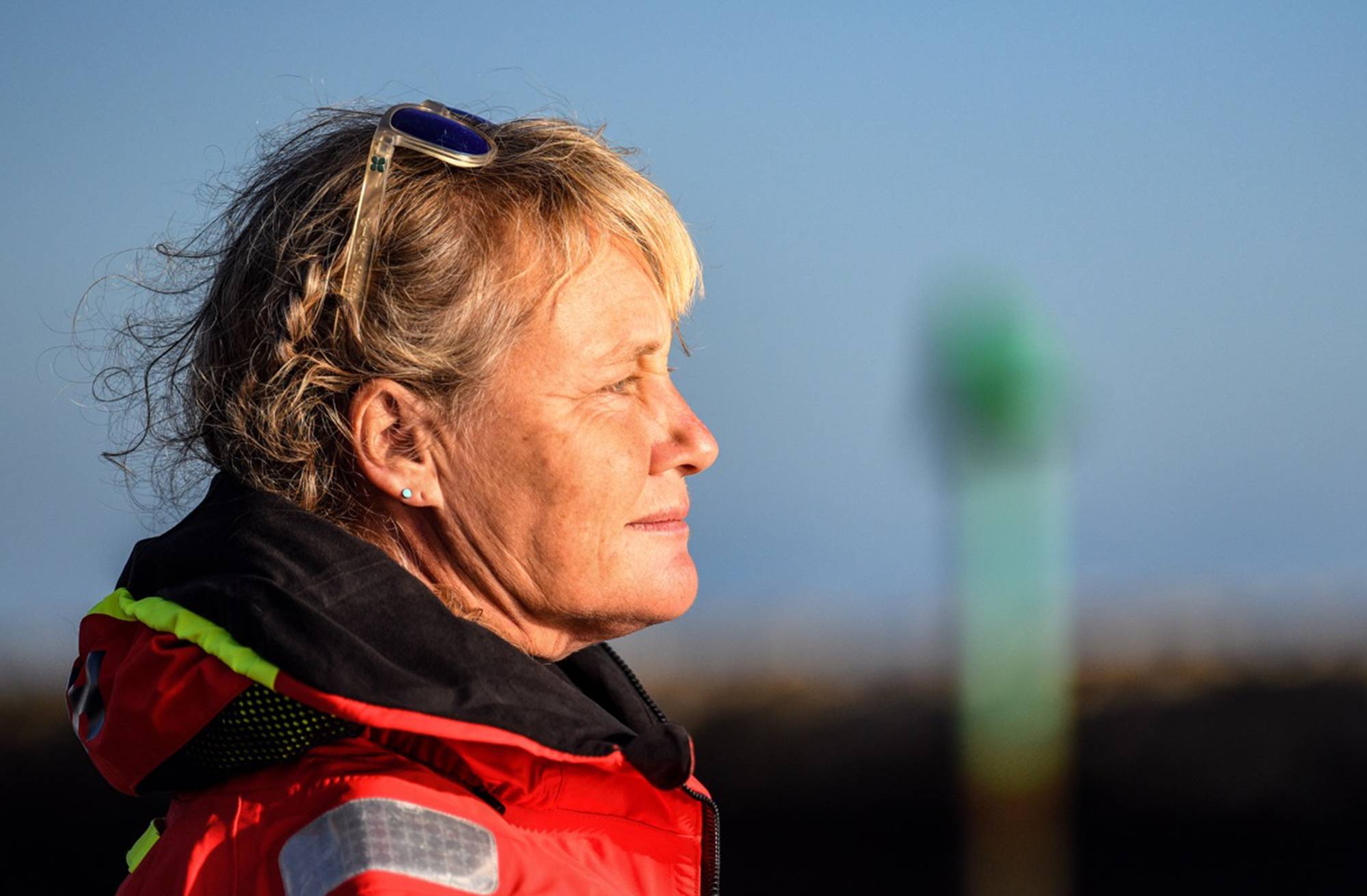
FACING THE UNKNOWN UNKNOWNS
Every sailor who lines up at the start of an ocean race, particularly the Vendée Globe Race, implicitly understands that some things might happen that are entirely out of their control—things that can end their race, and there is nothing they can do about it. You have to accept that as part of the sport. Something just breaks for no reason, or the autopilot just misses a beat and jibes the boat, and those things are not your fault, but they're part of the sport, and you have to accept it mentally.
"It's crazy when you think about it—you have this 60 foot enormous race-boat charging through the most remote ocean in the world on these weather systems that are pure and strong and have such momentum behind them and when you get it right, and you have to work hard to get it right, there is this kind of way that the boat and all the engineering and the design that's gone into the boat and the ocean and your effort as a human being, all of that just blends into this sort of bomb of energy and it is so exciting and so invigorating, and it's terrifying, and all of these energies and emotions and it just makes you tingle all over. I think the potential is so interesting because sailing a boat like that forces me to be the best version of me, the best human being I could possibly be; it forces me to perform in ways that I can't do anywhere else because there is no other option. There's always a level you can step up to, and the reward from stepping up to that level is so incredibly good that you want to find another level to step up to again."
TRUST IN YOURSELF
When you're in the midst of the ocean, you have to trust yourself. But, for Pip, this trust doesn't come cheap. "It might be a surprise to hear it, but I'm quite a cautious person, I'm quite measured in my approach to everything, and I also don't have a huge amount of confidence. So I normally do everything twice at a minimum. The first time is almost just to convince myself that I can do it," Pip says.
"But it's also to learn what the problem is, to understand what real performance looks like. And then, the second time, I can push myself beyond the limits and find somewhere else to go because now I know what the problem is, so I know how much better I can be. But I mean, the Vendée Globe was, without a doubt, also the best three months of my life. And it already feels like such a long time ago. I just want to go back there. I want to do it again, I want to feel like that again."
For Pip, sailing solo for many years has made her more emotionally resilient. Until last year's Vendée Globe, she never had a budget for satellite communications, which meant she was entirely on her own and forced to work things out quickly and without assistance.
"I'm used to being completely on my own, and one of the interesting things about my race was that I had satellite phones on the boat, but I hardly ever spoke to anyone through choice, and when I had a problem, I would text Joff, and we had this thing that if the phone ever rang he knew it was something bad," Pip says and laughs. She ended up ringing him twice, or maybe three times, she can't remember exactly. "We live our lives with massive support, we can pretty much reach out and talk to whoever we want, whenever we want, and that allows you not to confront or address emotions and problems in the way that you have to when you're alone. There is a massive difference between being lonely and being alone.
"There is a massive difference between being lonely and being alone." Pip Hare
"I've never felt bad sailing. No matter what's going on in my life or how I feel mentally, physically, emotionally, sailing has always brought me this peace. It just makes everything better, and I think there are several reasons on a fundamental level. When a human collides with natural elements, it can be a beautiful thing, invigorating. It restores some balance. Everything about being on the ocean—the sounds, the feeling, the temperature, everything I can see—it all makes me feel better. And then you have the performance element on top of it, which is so exciting. No one's going to help you; there is no way out, so you can't go for the soft option, but I think the rewards from pushing hard are so unbelievably good that it makes you look for the next level. It's just never-ending."
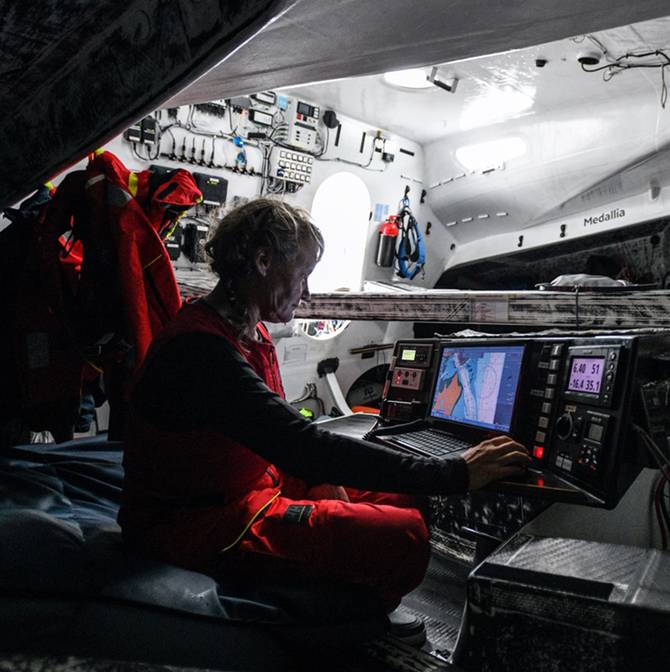
Two Column Image Text Left
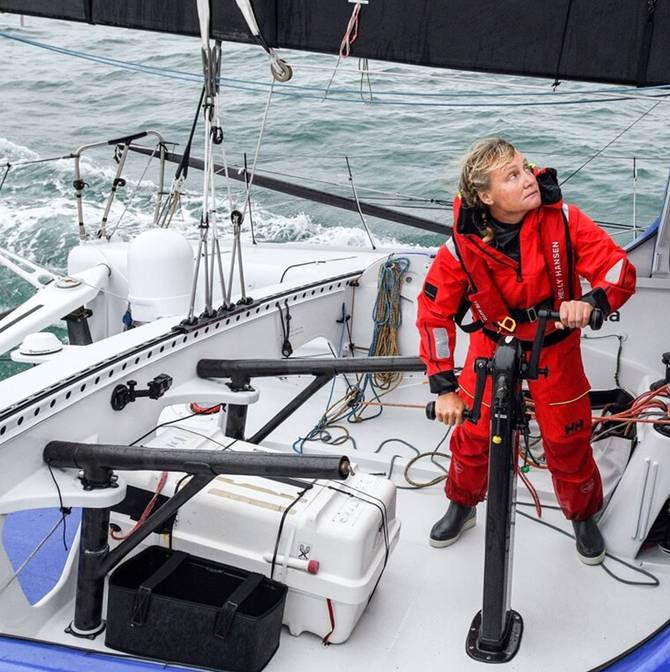
Two Column Image Text Right
TRUST IN YOUR TEAM
Earlier, Pip was a one-woman band, getting through the planning stages for races by scraping along the bottom with a crowdfund and help from volunteers and local businesses.
Becoming part of a team has made an enormous difference. "I think one of the most challenging things is that through my whole sailing career, I have maintained my own technical program. I've been responsible for getting my boats ready for races and the ongoing maintenance program. Then someone introduced me to Joff and mentioned his track record, which is unrivalled in the sport. He has prepared five boats for the Vendée Globe, and everyone finished [Joff Brown is one of the most experienced Technical Directors in Vendée Globe history and joined Pip’s team in 2019].
"One of the most difficult things I've found about transitioning into a team is being able to trust the people around me. It probably makes me a bit of a nightmare to work with, but if you are a solo sailor, you have to rely on yourself, and that's part of why I love the sport. I have to own my failure as well as my success. I have to own my mistakes and take responsibility for everything, and I think that's a thing I enjoy doing—it's something I've gotten used to doing, so if somebody else makes a mistake that has an impact on me, it's a more difficult thing to process.
“However, being part of an actual team and having people around me who believe in what I’m doing and want success in the same way that I do is incredible.”
Single Image Text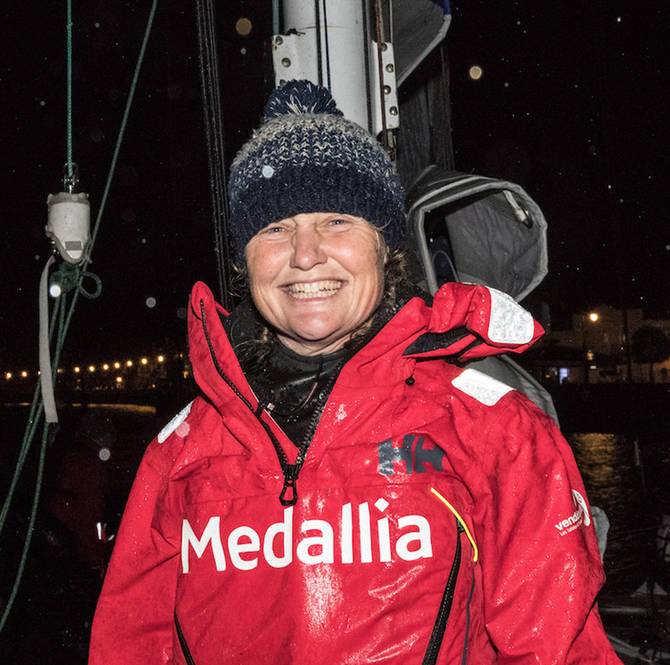
THE OCEAN IS WHERE I BELONG
Pip is quick to write off bravery as part of the formula. "I think bravery is when someone runs into a burning building to save another human being. Bravery is about putting yourself on the line for the good of someone else. What I do is for me, so maybe it's selfish rather than brave," she says.
"Being out on the water is where I belong, and nothing can break my connection with the ocean. The ocean is where I'm happiest." Pip Hare
"I am a very, very driven person, but I'm driven because this sport gives so much back to me. Being out on the water is where I belong, and nothing can break my connection with the ocean. The ocean is where I'm happiest. I see it as boundary-less, I see it as a place of opportunity, it represents hope to me, and one of the things that I love about being on the ocean is that I know that difficult times won't last forever. I love that about it because it's changing all the time. The more experience you have, the more time you spend on the ocean, the more you understand that sometimes it is hell on earth, sometimes it is so terrifying and so demoralising and just such an awful, terrible place to be, but you know that in 24 hours, 48 hours it's going to be different again and all you have to do is just get through the seconds and the hours and things will change.
"I think we all need dreams. Dreams are what take us forward through life, so don't be scared of dreaming and don't be scared to dream big and walk towards it. You don't have to run at it, you don't have to jump, just walk towards your dream, believe that you can get there—you might end up in a different place, but wherever you end up, it's going to be good, and it's better than standing still."



